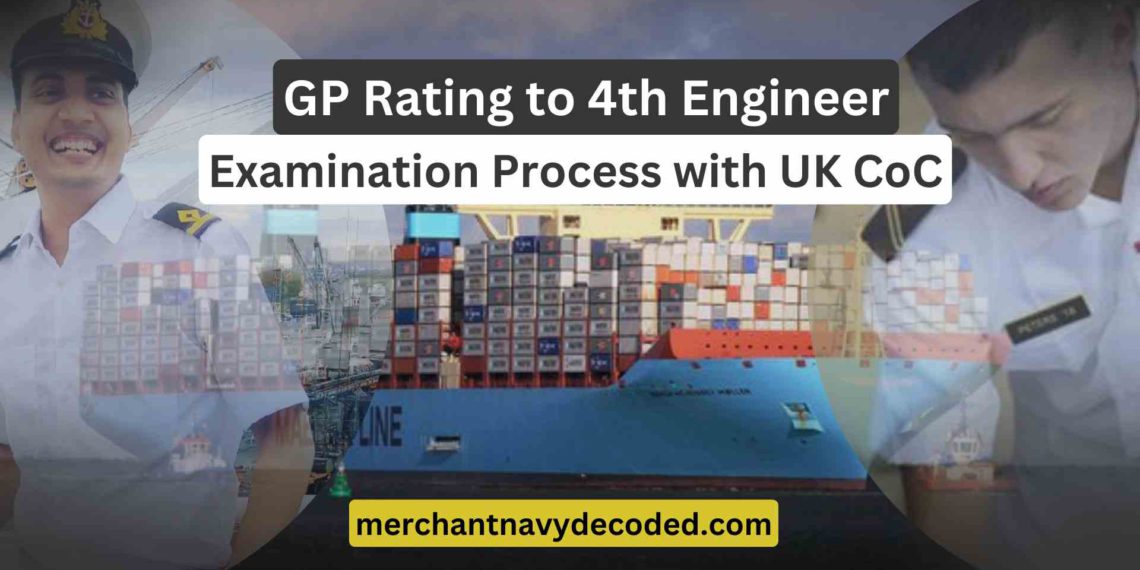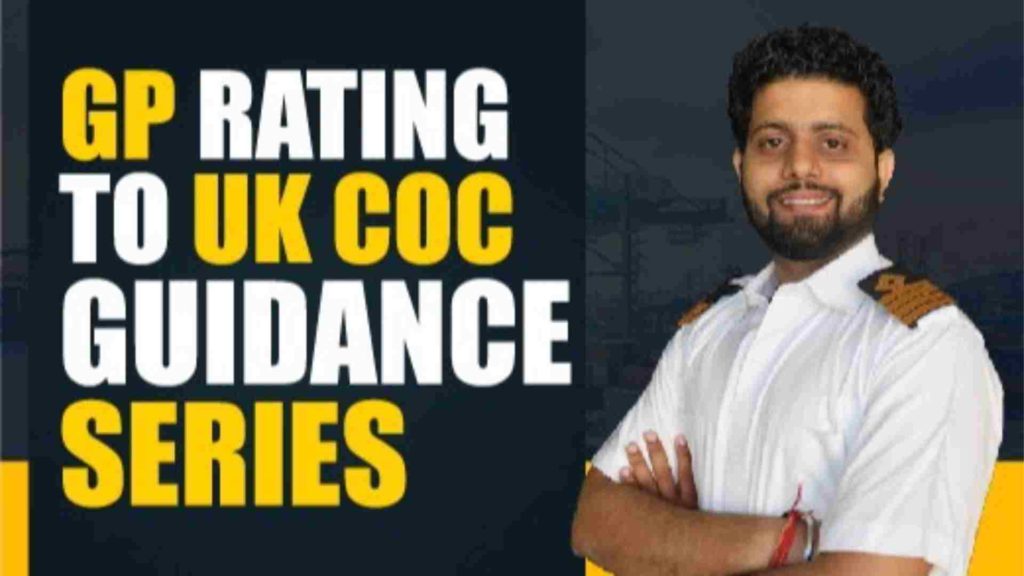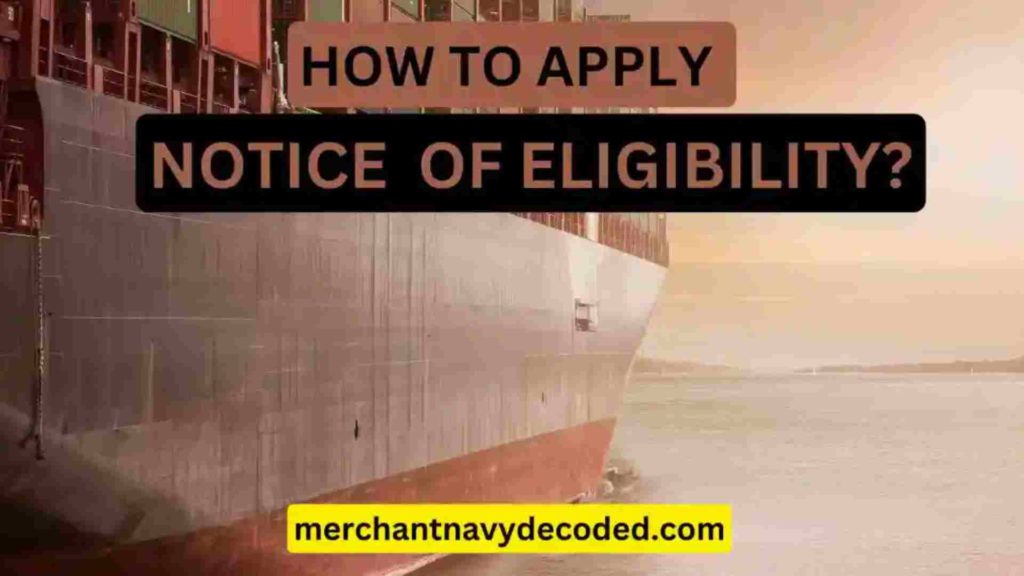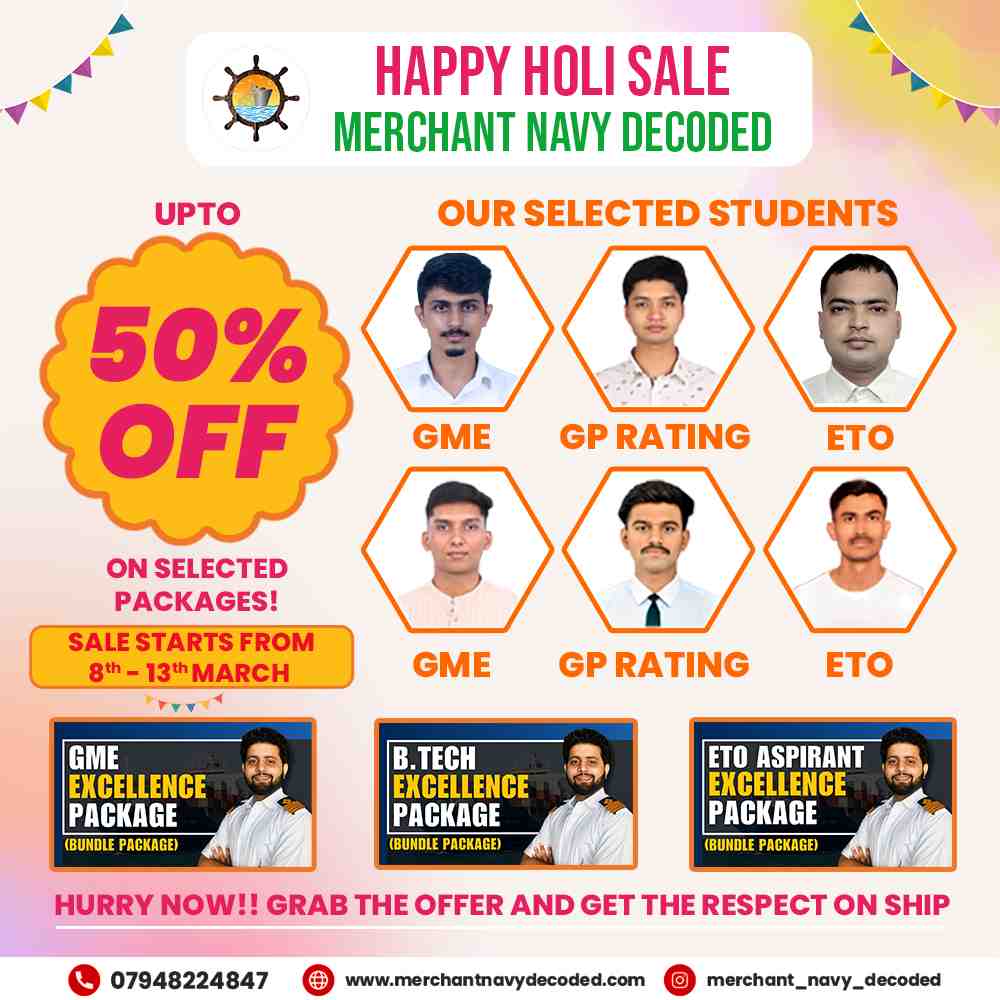GP Rating to 4th Engineer | Examination Process with UK CoC
Table of contents
Overview
A career at sea is an exciting journey and for individuals who want to get promoted from GP Rating to 4th Engineer, the United Kingdom offers a promising path.
The merchant navy is esteemed for its strict guidelines and dedication to security, therefore obtaining a UK CoC is an important step in one’s career. In addition to serving as a certificate of proficiency, this certification provides access to promotions to positions such as fourth engineer.
In this blog, Merchant Navy Decoded will guide you through the UK CoC test procedure for promotion from a GP Rating to a 4th Engineer.
Step 1:Check Your Eligibility for GP Rating to 4th Engineer
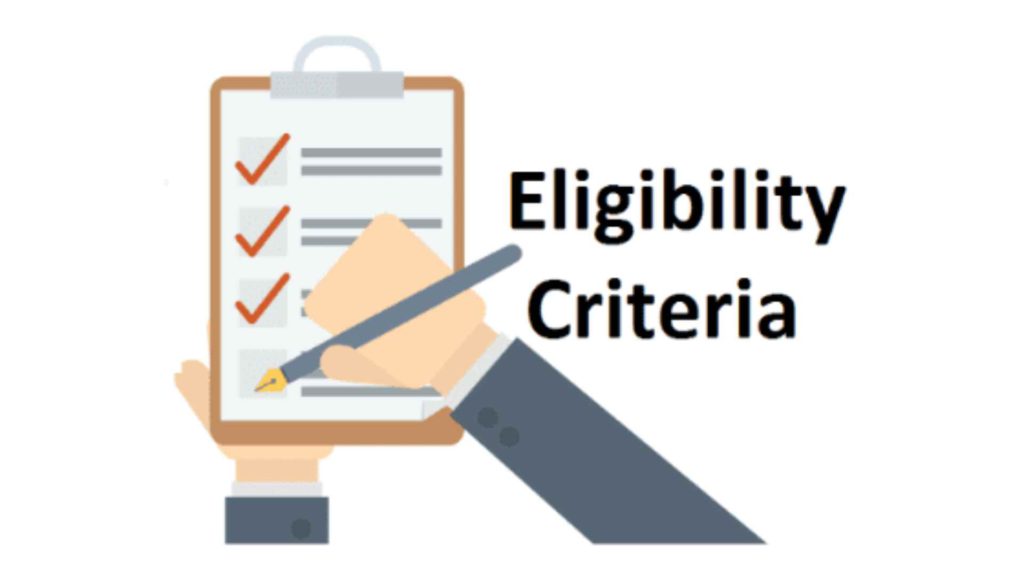
The first checkpoint in your route from a GP Rating to 4th Engineer is ensuring you meet the eligibility criteria. These are the eligibility criteria to become the fourth engineer from the GP rating:
| Sea Time Requirement | 24 months sea time as engine rating with watch keeping certificate (motorman, fitter, or oiler) |
| Watchkeeping Certificate | Motorman Oiler Watchkeeping Certificate IV(B)Fitter Watchkeeping Certificate |
Step 2: Apply for LOA & TAR Book
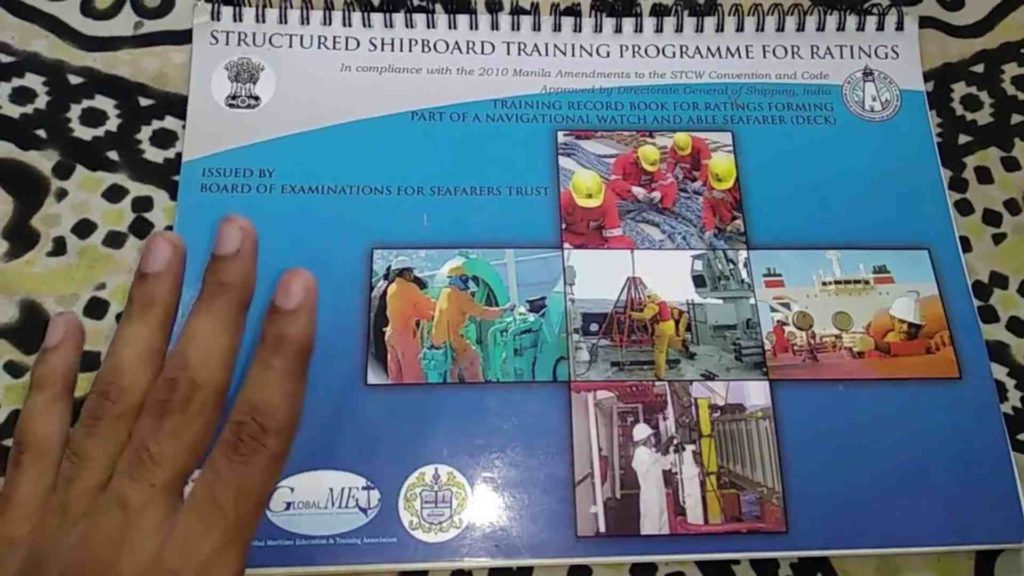
To promote from GP Rating to 4th Engineer, secure the LOA by completing the application with the necessary documents, including your passport and medical certification. Acquire the Tar Book to log practical training.
Applying for LOA:-
Documents Required for Letter of Acceptance
- Passport Copy
- Medical Certification
- DG Shipping COP (Certificate of Proficiency)
- Sea Testimonials
- Company Letter
- Watchkeeping Certificate III-4
- Course Certifications (EFA, FPFF, PST, PSSR, PSCRB)
- PAN Card
Sea Time Requirement for LOA
- A minimum of 9 months or 270 days at sea is required with your LOA and Tar Book, providing practical experience for your maritime career.
LOA Price
- Direct College Application: Rs.15916
- UK + India Blended Program: Rs.21964
LOA Approval
- After submitting your application, the college reviews your documents to ensure eligibility for Class 4 exams. If successful, you receive the LOA, a significant step in your maritime education.
Ready to become an Engineer/Officer from GP Rating? Check out the guide by Merchant Navy Decoded at
TAR Book
The TAR Book is a documented record of a seafarer’s onboard training experience, showcasing practical skills and knowledge gained during duty.
How to Apply for Tar Book
- Visit the Board of Examinations for Seafarers (BES) office during working hours.
- Required Documents: Passport-size photographs, CDC copy, Keeping Certificate, Board of Examinations GP Rating Certificate, UPI/UTR payment receipt, and completed request form.
TAR Book Price
- Deck Side: Rs. 400 per book (exclusive for Cop Able seafarers in Deck)
- Engine Side: Rs. 250 per book (exclusive for Cop Able seafarers in Engine)
- Electro-Technical Rating: Rs. 250 per book
- Additional Rs. 100 for courier services.
How to apply for the TAR Book?
Visit the official BES website (https://seafarers.edu.in/tar-book/) for issuance details, consignment numbers, and dispatch information.
For a detailed guide on How to apply LOA and TAR Book refer to the latest blog,
Step 3: Apply for NOE
The NOE is important for scheduling oral exams.
Send your documents to the UK MCA
- Collect and send important papers like passport copies, certificates, and medical fitness proof to get the Notice of Eligibility (NOE).
- Check that everything follows the rules in the application guide.
UK MCA will check your documentation
- The UK Maritime and Coastguard Agency (MCA) looks closely at your papers.
- They want to be sure your application fits their rules and is on the right track.
Get Confirmation and NOE Letter
- If your papers are good, the UK MCA will send a letter of NOE.
For a detailed guide on the application process for NOE, required documents, and step-by-step instructions, explore the comprehensive blog by Merchant Navy Decoded
Step 4: Apply for UK VISA
- To apply for a UK visa, check out the requirements, gather the necessary documents, and fill out the online application with precise information.
- Pay the VISA cost and make an appointment for the interview.
- Attend an interview, then wait for a decision before collecting the visa.
Step 5: Apply to UK College
Research and apply to a recognized UK college offering science programs. Follow the application guidelines, submit the required documents, and await admission confirmation.
Merchant Navy Decoded is there to help you, we are suggesting a few colleges which can help you in the journey to get your UK CoC.
Here are the college/ maritime schools for your UK CoC:
- South Shields Marine School
- City of Glasgow College
- Warsash Maritime School
- Fleetwood Nautical College
Step 6: Apply For Exam
Fill out an application for the Science A, B, Control Science, EK (Engineering Knowledge), GK (General Knowledge), and Workshop exams. Each exam costs between, Rs10610 – Rs14855
Semester 1: Science A and Science B
Semester 2:Control Science, EK, GK, and Workshop
Fee for Re-exam for UK CoC
If you are unsuccessful, you can retake the exam for a fee of £100-160. Prepare thoroughly for a successful retake.
Fees for oral exams and NOEs for UK CoC
The fees for oral exams are included in the Notice of Eligibility (NOE) process.
Clear all tests, apply for your UK Certificate of Competency (CoC), and begin your career in the merchant navy.
Conclusion
Q1. What is a LOA (Letter of Acceptance)?
Ans. LOAs are important documents for people aiming to be 4th Engineers because they indicate acceptance into maritime universities for Class 4 exams.
Q2. What are the requirements for taking Class 4 exams?
Ans. 24 months of sea time as an engine rating with a watchkeeping certificate (motorman, fitter, or oiler) is required for eligibility.
Q3. How does the UK MCA go through NOE documentation?
Ans. The UK MCA thoroughly checks submitted documents to ensure that they comply with the laws and eligibility criteria.
Q4. What is the application process for exams?
Ans. Fill out applications for £100-£140 Science A, Science B, Control Science, EK, GK, and Workshop exams.
Disclaimer :- The opinions expressed in this article belong solely to the author and may not necessarily reflect those of Merchant Navy Decoded. We cannot guarantee the accuracy of the information provided and disclaim any responsibility for it. Data and visuals used are sourced from publicly available information and may not be authenticated by any regulatory body. Reviews and comments appearing on our blogs represent the opinions of individuals and do not necessarily reflect the views of Merchant Navy Decoded. We are not responsible for any loss or damage resulting from reliance on these reviews or comments.
Reproduction, copying, sharing, or use of the article or images in any form is strictly prohibited without prior permission from both the author and Merchant Navy Decoded.

